Create a Token Forwarder
This guide will teach you how to create a basic custom Universal Receiver Delegate contract for the following use-case:
"As a Universal Profile (UP) owner, I want to transfer part of the tokens I received to another UP".
We will this contract an LSP1 Forwarder. Every time our 🆙 will receive a specific LSP7 token, this contract will automatically transfer a certain percentage to another address we have defined.
An example scenario could be: "each time I receive USDT, I want to automatically transfer 20% to my wife's UP".
Setup & Requirements
If you want to follow this guide using not an existing token, but a new token that you want to create and deploy yourself, check our guide "Create a Custom LSP7 Token".
This guide is working with version above 0.14.0 of the @lukso/lsp-smart-contracts package.
In order to follow this guide, you will need the following:
- Download and install the UP Browser extension.
- Fund the main EOA controller of your 🆙 (See Step 1 bullet point 3 to retrieve its address) using the Testnet Faucet.
- The address of the LSP7 token that you want to use to forward of portion of the amount received.
- The v0.14.0
@lukso/lsp-smart-contractslibrary installed. - The erc725.js library installed to encode the data key / value to register our LSP1 Forwarder.
- The
dotenvpackage to load our main EOA controller private key into our script.
npm i @lukso/[email protected] @erc725/erc725.js dotenv
Step 1 - Enable your controller to Add & Edit a Universal Receiver
First, we will need to enable adding a Universal Receiver for the main controller of our UP. To do that:
- Open the UP Browser Extension in your web browser.
- Click on the "Controller" tab.
- Select "UP Extension" which.
This will bring the controller information page that you see below. From there:
- Scroll down to the "Administration & Ownership" part
- Toggle ON the "Add notifications & automation" + "Edit notifications & automation" permission.
- Confirm the changes and submit the transaction.
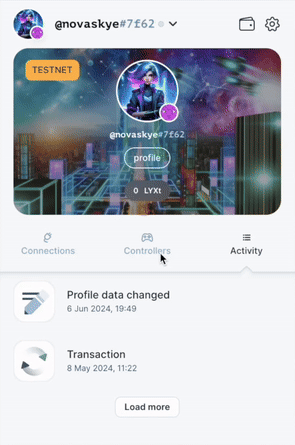
Step 2 - Create LSP1 Forwarder contract in Solidity
We can make our LSP1 Forwarder contract to perform this action in 2 different ways, via 2 different interaction flows.
Two Design Options
To re-transfer a portion of the tokens received, we can instruct the LSP1 Forwarder contract to re-call the transfer(...) function on the LSP7 Token contract in 2 ways:
- method 1: via the
execute(...)function of the 🆙. - method 2: directly on the LSP7 contract after having authorized the LSP1 Forwarder as an operator via
authorizeOperator(...).
For method 1 to work, the LSP1 Forwarder contract will need the permissions SUPER_CALL + REENTRANCY on the UP.
For method 2 to work, the LSP1 Forwarder contract needs to be authorized as an operator at the LSP7 level (using authorizeOperator) with unlimited amount (type(uint256).max).
Both methods have their advantages and disadvantages, as summarized below.
| Design Method | Advantages 👍🏻 | Disadvantages 👎🏻 |
|---|---|---|
Method 1: via 🆙 execute(...) function | Does not requires additional setup (authorizeOperator operation) Can trace the transfer from your UP transactions' activity tab | Cost a bit more gas (+/- 23k) compared to method 2 on the re-transfer transaction. |
Method 2: via authorizeOperator(...) on LSP7 Token contract 🪙 | More gas efficient. | You have to authorize your URD to spend your LSP7 token for an unlimited amount |
Solidity code
Select one of the two tabs below to see the Solidity implementation of each design.
The code is commented enough to be self explanatory, but let's dive a bit more into some interesting bits.
- via UP execute(...) call (recommended)
- using LSP1 Forwarder as an operator
This method leverages the Key Manager's permissions instead of token operator approval.
It is the recommended method, making managing which tokens the LSP1 Forwarder can re-transfer easier.
// SPDX-License-Identifier: CC0-1.0
pragma solidity ^0.8.11;
// interfaces
import { IERC725X } from "@erc725/smart-contracts/contracts/interfaces/IERC725X.sol";
import { ILSP1UniversalReceiverDelegate as ILSP1Delegate } from "@lukso/lsp-smart-contracts/contracts/LSP1UniversalReceiver/ILSP1UniversalReceiverDelegate.sol";
import { ILSP7DigitalAsset } from "@lukso/lsp-smart-contracts/contracts/LSP7DigitalAsset/ILSP7DigitalAsset.sol";
// modules
import { ERC165 } from "@openzeppelin/contracts/utils/introspection/ERC165.sol";
import { ERC165Checker } from "@openzeppelin/contracts/utils/introspection/ERC165Checker.sol";
import "@openzeppelin/contracts/utils/Strings.sol";
// constants
import { _TYPEID_LSP7_TOKENSRECIPIENT } from "@lukso/lsp-smart-contracts/contracts/LSP7DigitalAsset/LSP7Constants.sol";
import "@lukso/lsp-smart-contracts/contracts/LSP1UniversalReceiver/LSP1Constants.sol";
import "@lukso/lsp-smart-contracts/contracts/LSP0ERC725Account/LSP0Constants.sol";
// errors
import "@lukso/lsp-smart-contracts/contracts/LSP1UniversalReceiver/LSP1Errors.sol";
contract LSP1Forwarder is ERC165, ILSP1Delegate {
// CHECK onlyOwner
modifier onlyOwner {
require(msg.sender == owner, "Not the owner");
_;
}
// Owner
address owner;
// Set a recipient
address public recipient;
// Set a percentage to send to recipient
uint256 public percentage;
// Set a mapping of authorized LSP7 tokens
mapping (address => bool) allowlist;
// we set the recipient & percentage & allowedAddresses of the deployer in the constructor for simplicity
constructor(address _recipient, uint256 _percentage, address[] memory tokenAddresses) {
require(_percentage < 100, "Percentage should be < 100");
recipient = _recipient;
percentage = _percentage;
owner = msg.sender;
for (uint256 i = 0; i < tokenAddresses.length; i++) {
allowlist[tokenAddresses[i]] = true;
}
}
function addAddress(address token) public onlyOwner {
allowlist[token] = true;
}
function setRecipient(address _recipient) public onlyOwner {
recipient = _recipient;
}
function setPercentage(uint256 _percentage) public onlyOwner {
require(_percentage < 100, "Percentage should be < 100");
percentage = _percentage;
}
function removeAddress(address token) public onlyOwner {
allowlist[token] = false;
}
function getAddressStatus(address token) public view returns (bool) {
return allowlist[token];
}
function universalReceiverDelegate(
address notifier,
uint256 value,
bytes32 typeId,
bytes memory data
) public virtual returns (bytes memory) {
// CHECK that the caller is an a UniversalProfile
// by checking it supports the LSP0ERC725Account interface
if (
!ERC165Checker.supportsERC165InterfaceUnchecked(
msg.sender,
_INTERFACEID_LSP0
)
) {
return "Caller is not a LSP0";
}
// CHECK that notifier is a contract with a `balanceOf` method
// and that msg.sender (the UP) has a positive balance
if (notifier.code.length > 0) {
try ILSP7DigitalAsset(notifier).balanceOf(msg.sender) returns (
uint256 balance
) {
if (balance == 0) {
return "LSP1: balance is zero";
}
} catch {
return "LSP1: `balanceOf(address)` function not found";
}
}
// CHECK that the address of the LSP7 is whitelisted
if (!allowlist[notifier]) {
return "Token not in allowlist";
}
// extract data (we only need the amount that was transferred / minted)
(, , , uint256 amount, ) = abi.decode(
data,
(address, address, address, uint256, bytes)
);
// CHECK that amount is not too low
if (amount < 100) {
return "Amount is too low (< 100)";
} else {
uint256 tokensToTransfer = (amount * percentage) / 100;
bytes memory tokenTransferCalldata = abi.encodeCall(
ILSP7DigitalAsset.transfer,
msg.sender,
recipient,
tokensToTransfer,
true,
""
);
IERC725X(msg.sender).execute(0, notifier, 0, tokenTransferCalldata);
return "";
}
}
function supportsInterface(
bytes4 interfaceId
) public view virtual override returns (bool) {
return
interfaceId == _INTERFACEID_LSP1_DELEGATE ||
super.supportsInterface(interfaceId);
}
}
Let's dive in some of the details of the universalReceiverDelegate(...) function. The flow works as follow:
-
(lines 83-90) We first verify that the caller
msg.senderis a Universal Profile. -
(lines 94-103) We checked that we are being notified by a smart contract. If we manage to call the
balanceOf(address)function, we assume it is an LSP7 Token contract. -
(lines 107-109) We then ensure that this token is in our list of tokens to transfer some percentage of to another address.
-
(lines 112-121) The LSP7 Token contract sent us in the notification
data(function param line 79) the amount of tokens that were transferred.- (line 112) We extract only this
amountfrom thedatareceived . The other infos in the data are not necessary so not used. - (line 121) We calculate the proportion to re-transfer (local variable
tokensToTransfer,) according to thepercentageset (state variable line 37).
- (line 112) We extract only this
-
(line 123-129) We encode a call to the
transfer(...)function on the LSP7 Token contract, using the Solidity built-in functionencodeCall. The 4 parameters being encoded for the function call are:from: (msg.sender) = this UP that received the tokens.to: (recipient) = the address that will receives the percentage of tokens.amount: (tokensToTransfer) = the calculated percentage of the total amount received.allowNonLSP1Recipient: indicates if we can transfer to any address (true), or if it must be an LSP1 enabled one (false).data: no additional data
-
(line 131) After having saved this abi-encoded calldata, we execute this call via the UP. This is done by using the
execute(...)function on the 🆙 (a generic execution function). We know from step 1 that themsg.senderis a Universal Profile. So we can safely explicitly castmsg.senderto anERC725Xcontract to use theexecute(...)function. The parameters passed are:operationType: 0 = CALL operationtarget: thenotifier(function parameter, line 76) = our LSP7 contractvalue: 0 = no LYX are sentdata: thetokenTransferCalldatavariable. This is our encoded call to thetransfer(...)function on the LSP7 token, generated in step 5.
For this method to work, the LSP1 Forwarder needs to be authorized as an operator (via authorizeOperator(...)) to spend tokens on behalf of the 🆙.
It can be cumbersome to manage, as the LSP1Forwarder contract would need to be approved as an operator for every single token we want to allow to re-transfer. This would require multiple authorizeOperator(...) calls to multiple token contracts, creating more transactions that can be gas-expensive.
(can be mitigated by grouping these in an executeBatch(...)).
In comparison, the first design (via UP.execute(...) call) is easier to manage, as the LSP1Forwarder can be granted permission once for multiple tokens via one single setData(...) call.
// SPDX-License-Identifier: CC0-1.0
pragma solidity ^0.8.11;
// interfaces
import { IERC725X } from "@erc725/smart-contracts/contracts/interfaces/IERC725X.sol";
import { ILSP1UniversalReceiverDelegate as ILSP1Delegate } from "@lukso/lsp-smart-contracts/contracts/LSP1UniversalReceiver/ILSP1UniversalReceiverDelegate.sol";
import { ILSP7DigitalAsset } from "@lukso/lsp-smart-contracts/contracts/LSP7DigitalAsset/ILSP7DigitalAsset.sol";
// modules
import { ERC165 } from "@openzeppelin/contracts/utils/introspection/ERC165.sol";
import { ERC165Checker } from "@openzeppelin/contracts/utils/introspection/ERC165Checker.sol";
import "@openzeppelin/contracts/utils/Strings.sol";
// constants
import { _TYPEID_LSP7_TOKENSRECIPIENT } from "@lukso/lsp-smart-contracts/contracts/LSP7DigitalAsset/LSP7Constants.sol";
import "@lukso/lsp-smart-contracts/contracts/LSP1UniversalReceiver/LSP1Constants.sol";
import "@lukso/lsp-smart-contracts/contracts/LSP0ERC725Account/LSP0Constants.sol";
// errors
import "@lukso/lsp-smart-contracts/contracts/LSP1UniversalReceiver/LSP1Errors.sol";
contract LSP1Forwarder is ERC165, ILSP1Delegate {
// CHECK onlyOwner
modifier onlyOwner {
require(msg.sender == owner, "Not the owner");
_;
}
// Owner
address owner;
// Set a recipient
address public recipient;
// Set a percentage to send to recipient
uint256 public percentage;
// Set a mapping of authorized LSP7 tokens
mapping (address => bool) allowlist;
// we set the recipient & percentage & allowedAddresses of the deployer in the constructor for simplicity
constructor(address _recipient, uint256 _percentage, address[] memory tokenAddresses) {
require(_percentage < 100, "Percentage should be < 100");
recipient = _recipient;
percentage = _percentage;
owner = msg.sender;
for (uint256 i = 0; i < tokenAddresses.length; i++) {
allowlist[tokenAddresses[i]] = true;
}
}
function addAddress(address token) public onlyOwner {
allowlist[token] = true;
}
function setRecipient(address _recipient) public onlyOwner {
recipient = _recipient;
}
function setPercentage(uint256 _percentage) public onlyOwner {
require(_percentage < 100, "Percentage should be < 100");
percentage = _percentage;
}
function removeAddress(address token) public onlyOwner {
allowlist[token] = false;
}
function getAddressStatus(address token) public view returns (bool) {
return allowlist[token];
}
function universalReceiverDelegate(
address notifier,
uint256 value,
bytes32 typeId,
bytes memory data
) public virtual returns (bytes memory) {
// CHECK that the caller is an ERC725Account (e.g: a UniversalProfile)
// by checking it supports the LSP0 interface
if (
!ERC165Checker.supportsERC165InterfaceUnchecked(
msg.sender,
_INTERFACEID_LSP0
)
) {
return "Caller is not a LSP0";
}
// CHECK that notifier is a contract with a `balanceOf` method
// and that msg.sender (the UP) has a positive balance
if (notifier.code.length > 0) {
try ILSP7DigitalAsset(notifier).balanceOf(msg.sender) returns (
uint256 balance
) {
if (balance == 0) {
return "LSP1: balance is zero";
}
} catch {
return "LSP1: `balanceOf(address)` function not found";
}
}
// CHECK that the address of the LSP7 is whitelisted
if (!allowlist[notifier]) {
return "Token not in allowlist";
}
// extract data (we only need the amount that was transferred / minted)
(, , , uint256 amount, ) = abi.decode(
data,
(address, address, address, uint256, bytes)
);
// CHECK if amount is not too low
if (amount < 100) {
return "Amount is too low (< 100)";
} else {
uint256 tokensToTransfer = (amount * percentage) / 100;
ILSP7DigitalAsset(notifier).transfer(msg.sender, recipient, tokensToTransfer, true, "");
return "";
}
}
function supportsInterface(
bytes4 interfaceId
) public view virtual override returns (bool) {
return
interfaceId == _INTERFACEID_LSP1_DELEGATE ||
super.supportsInterface(interfaceId);
}
}
See our notice above the code snippet for the main drawbacks of the method
Let's dive in some of the details of the universalReceiverDelegate(...) function. The flow works as follow:
-
(lines 83-90) We first verify that the caller
msg.senderis a Universal Profile. -
(lines 94-103) We checked that we are being notified by a smart contract. If we manage to call the
balanceOf(address)function, we assume it is an LSP7 Token contract. -
(lines 107-109) We then ensure that this token is in our list of tokens to transfer some percentage of to another address.
-
(lines 112-121) The LSP7 Token contract sent us in the notification
data(function param line 79) the amount of tokens that were transferred.- (line 112) We extract only this
amountfrom thedatareceived . The other infos in the data are not necessary so not used. - (line 121) We calculate the proportion to re-transfer (local variable
tokensToTransfer,) according to thepercentageset (state variable line 37).
- (line 112) We extract only this
-
(line 123) Since we allowed the LSP1 Forwarder as an operator, we directly call the
transfer(...)function on the LSP7 token contract (thenotifier, passed as function parameter in line 76).
Step 3 - Deploy our LSP1 Forwarder
Now that we have created our custom LSP1 Delegate Forwarder contract, we will deploy it on LUKSO Testnet.
Let's first compile our contract to generate its ABI and bytecode.
hardhat compile
Setup the LUKSO Testnet network in your hardhat.config.ts.
// ...
const config: HardhatUserConfig = {
// ...
networks: {
luksoTestnet: {
live: true,
url: '**https**://rpc.testnet.lukso.network',
chainId: 4201,
saveDeployments: true,
},
},
// ...
};
// ...
export default config;
We will use a Hardhat script to deploy our LSP1 Forwarder contract. We will use our main controller address by exporting its private key from the UP Browser Extension. Create the following .env file and add the main controller private key exported from the 🆙 Browser Extension:
PRIVATE_KEY=""
Create the following file under the scripts/ folder in your Hardhat project.
import hre from 'hardhat';
import { ethers } from 'hardhat';
import * as dotenv from 'dotenv';
import LSP1URDForwarder from "../artifacts/contracts/Tokens/LSP1URDForwarder.sol/LSP1URDForwarder.json';";
// load env vars
dotenv.config();
// setup provider
const provider = new ethers.JsonRpcProvider(
'https://rpc.testnet.lukso.network',
);
// You can update the value of the allowed LSP7 token
const MY_USDC_TOKEN = '0x63890ea231c6e966142288d805b9f9de7e0e5927';
// setup signer (the browser extension main controller)
const signer = new ethers.Wallet(process.env.PRIVATE_KEY as string, provider);
console.log('Main 🆙 Controller address (EOA 🔑): ', signer.address);
// -----------------------------
// DEPLOY LSP1 Delegate contract
// -----------------------------
const lsp1ForwarderFactory = new ethers.ContractFactory(
LSP1URDForwarder.abi,
LSP1URDForwarder.bytecode,
signer,
);
const lsp1Forwarder = await lsp1ForwarderFactory.deploy(
'0xd33D2Cd7035e508043983283CD8E870dfAbEA844', // Token recipient
'20', // Percentage % of token to re-transfer to Token Recipient
[MY_USDC_TOKEN],
);
console.log(
'✅ Custom URD successfully deployed at address: ',
lsp1Forwarder.address,
);
Run the command below to deploy our custom LSP1 Forwarder contract on LUKSO Testnet:
npx hardhat run scripts/deployLSP1Forwarder.ts --network luksoTestnet
Step 4 - Setup our LSP1 Forwarder
Now that we have deployed our custom LSP1 Forwarder contract, we will register it and set it up on our Universal Profile.
4.1 - Register on the UP
We will register this LSP1 Forwarder for the LSP1 Type Id LSP7Tokens_RecipientNotification. This type Id is used to notify the Universal Profile that it received some new tokens.
To do that, use the LSP1UniversalReceiverDelegate:<bytes32> Mapping data key, where the <bytes32> part will be the type Id. The erc725.js library will enable us to do that easily.
import ethers from 'ethers';
import ERC725 from '@erc725/erc725.js';
import LSP1Schema from '@erc725/erc725js/schemas/LSP1UniversalReceiver.json';
import LSP6Schema from '@erc725/erc725js/schemas/LSP6KeyManager.json';
import { LSP1_TYPE_IDS } from '@lukso/lsp-smart-contracts';
import UniversalProfile from '@lukso/lsp-smart-contracts/artifacts/UniversalProfile.json';
// code from previous steps here...
// including the instance of the `lsp1Forwarder` contract.
const lsp1Forwarder = await lsp1ForwarderFactory.deploy(
'0xd33D2Cd7035e508043983283CD8E870dfAbEA844', // Token recipient
'20', // Percentage % of token to re-transfer to Token Recipient
[MY_USDC_TOKEN],
);
const erc725 = new ERC725(LSP1Schema);
const { keys, values } = erc725.encodeData([
{
keyName: 'LSP1UniversalReceiverDelegate:<bytes32>',
dynamicKeyPart: LSP1_TYPE_IDS.LSP7Tokens_RecipientNotification,
value: lsp1Forwarder.address,
},
]);
const universalProfile = new ethers.Contract(
'0x...', // Universal Profile address
UniversalProfile.abi,
signer,
);
// register the LSP1 Forwarder for the notification type when we receive new LSP7 tokens
const setDataTx = await universalProfile.setData(keys[0], values[0]);
await setDataTx.wait();
console.log('✅ Custom LSP1 Delegate has been correctly registered on the UP');
4.2 - Setup permissions / operator
Depending on the design / method selected in step 2, we will have to setup our LSP1 Forwarder contract differently:
| Method | Setup Required |
|---|---|
Method 1: via 🆙 execute(...) function | Grant the permissions SUPER_CALL + REENTRANCY to the LSP1 Forwarder contract so that it can re-call the 🆙. |
Method 2: via authorizeOperator(...) on LSP7 Token contract 🪙 | Authorize the address of the LSP1 Forwarder contract as an operator, to spend tokens on behalf of the UP. This using the authorizeOperator() function on the LSP7 token contract. |
- Method 1 - Set Permissions for LSP1 Forwarder
- Method 2 - Set LSP1 Forwarder as an operator
With this method, we will set the permission SUPER_CALL and REENTRANCY on our 🆙 for the LSP1 Forwarder.
import ERC725 from '@erc725/erc725.js';
import LSP6Schema from '@erc725/erc725js/schemas/LSP6KeyManager.json';
import { PERMISSIONS } from '@lukso/lsp-smart-contracts';
import UniversalProfile from '@lukso/lsp-smart-contracts/artifacts/UniversalProfile.json';
// code from previous step here...
// including the instance of the `lsp1Forwarder` contract.
const lsp1Forwarder = await lsp1ForwarderFactory.deploy(
'0xd33D2Cd7035e508043983283CD8E870dfAbEA844', // Token recipient
'20', // Percentage % of token to re-transfer to Token Recipient
[MY_USDC_TOKEN],
);
const erc725 = new ERC725(LSP1Schema);
const { keys, values } = erc725.encodeData([
{
keyName: 'AddressPermissions:Permissions:<address>',
value: ERC725.encodePermissions({
SUPER_CALL: true,
REENTRANCY: true,
}),
},
]);
// Create an instance of our Universal Profile
const universalProfile = new ethers.Contract(
'0x...', // Universal Profile address
UniversalProfile.abi,
signer,
);
// Set the permissions of the LSP1 Forwarder on our UP
const setPermissionsTx = await universalProfile.setData(keys[0], values[0]);
await setPermissionsTx.wait();
console.log('✅ Custom LSP1 Forwarder permissions have been set successfully');
import ethers from 'ethers';
import UniversalProfile from '@lukso/lsp-smart-contracts/artifacts/UniversalProfile.json';
import LSP7DigitalAsset from '@lukso/lsp-smart-contracts/artifacts/LSP7DigitalAsset.json';
// code from previous steps here...
// including the instance of the `lsp1Forwarder` and the address of the LSP7 Token contract.
const MY_USDC_TOKEN = '0x63890ea231c6e966142288d805b9f9de7e0e5927';
const lsp1Forwarder = await lsp1ForwarderFactory.deploy(
'0xd33D2Cd7035e508043983283CD8E870dfAbEA844', // Token recipient
'20', // Percentage % of token to re-transfer to Token Recipient
[MY_USDC_TOKEN],
);
// Create an instance of our Universal Profile
const universalProfile = new ethers.Contract(
'0x...', // Universal Profile address
UniversalProfile.abi,
signer,
);
console.log('⏳ Authorizing Custom LSP1 Delegate contract on Custom Token');
const lsp7Interface = new ethers.Interface(LSP7DigitalAsset.abi);
const authorizeOperatorCalldata = const authBytes = lsp7Interface.encodeFunctionData(
'authorizeOperator',
[lsp1Forwarder.address, ethers.MaxUint256, '0x'], // we authorize the LSP1 Forwarder to spend an unlimited amount of the UP's USDC Tokens
);
// Execute the function call as the UP
const authTxWithBytes = await universalProfile.execute(
OPERATION_TYPES.CALL,
MY_USDC_TOKEN,
0,
authBytes,
);
await authTxWithBytes.wait();
console.log('✅ LSP1 Forwarder contract authorized on My USDC Token for UP 🫡');
🧪 Testing our LSP1 Forwarder
Now that all the pieces are connected, we can try it out!
The expected behaviour is that every time the UP on which the custom LSP1 Forwarder contract has been set receives an allowed token (either through transfer or mint), it will automatically send a percentage to the specified recipient.
Here are the test data:
- I set up the custom LSP1 Delegate contract on a test UP (neo:
0xD62940E95A7A4a760c96B1Ec1434092Ac2C4855E) - I created a custom LSP7 token named "My USDC" with symbol "MUSDC" (LSP7:
0x63890ea231c6e966142288d805b9f9de7e0e5927/ owner neo / 20k pre-minted to neo) - The custom LSP1 Delegate contract will send 20% of the received (transfer or mint) MUSDC
- The recipient will be another test UP (karasu:
0xe5B9B2C3f72bA13fF43A6CfC6205b5147F0BEe84) - The custom LSP1 Delegate contract is deployed at address
0x4f614ebd07b81b42373b136259915b74565fedf5
Let's go to the test dapp and connect with neo's profile.
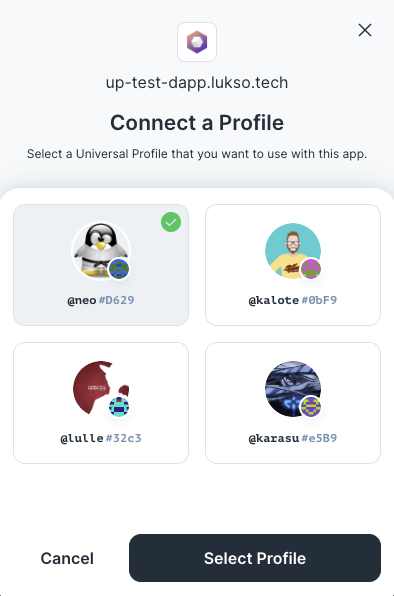
Click on "Refresh tokens" to see our MUSDC balance.
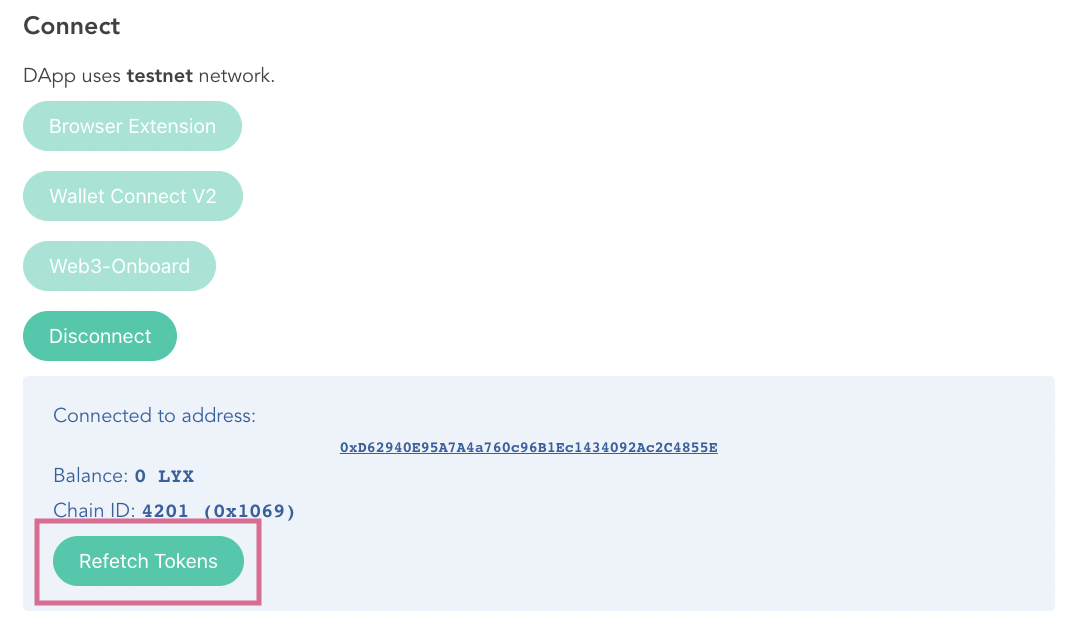
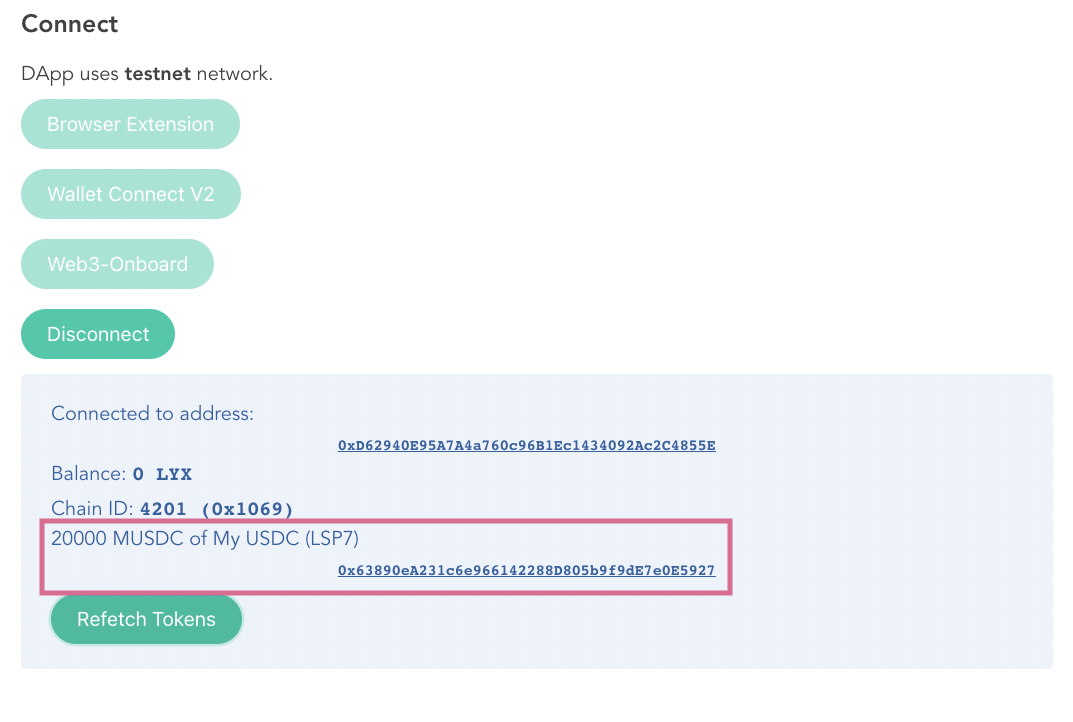
Use the "Mint" box to mint an additional 10k MUSDC to ourself (to neo's UP). This should trigger the custom LSP1 Delegate forwarder and send 20% of 10k (= 2k) to karasu.
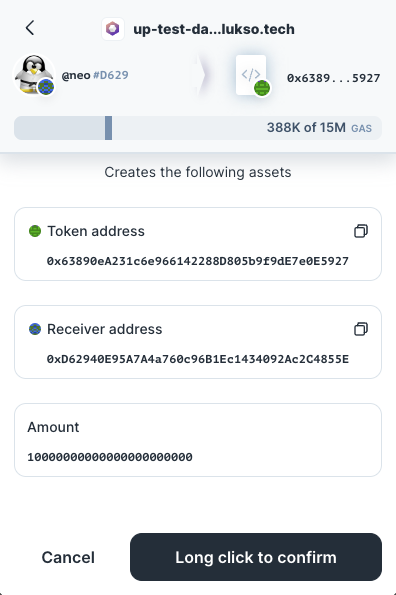
We will then disconnect neo's profile from the test dapp.
There is a bug currently on the test dapp where the disconnect button doesn't work properly. In order to disconnect from the dapp, we need to remove the connection from the "connections" tab by clicking the ❌ icon on the right.
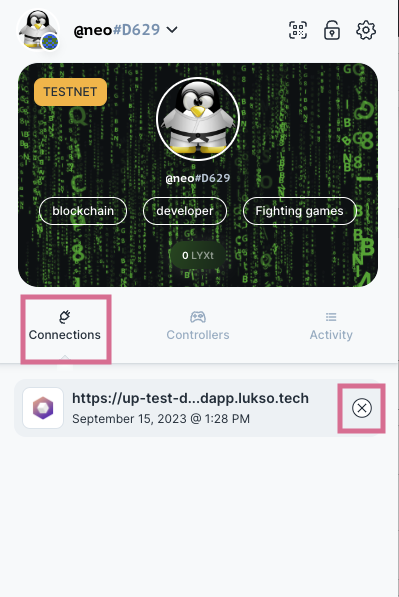
We connect karasu's profile to the test dapp
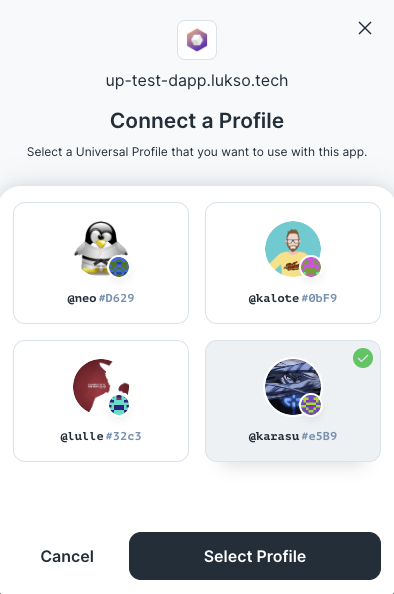
... click on "Refresh tokens" and ...
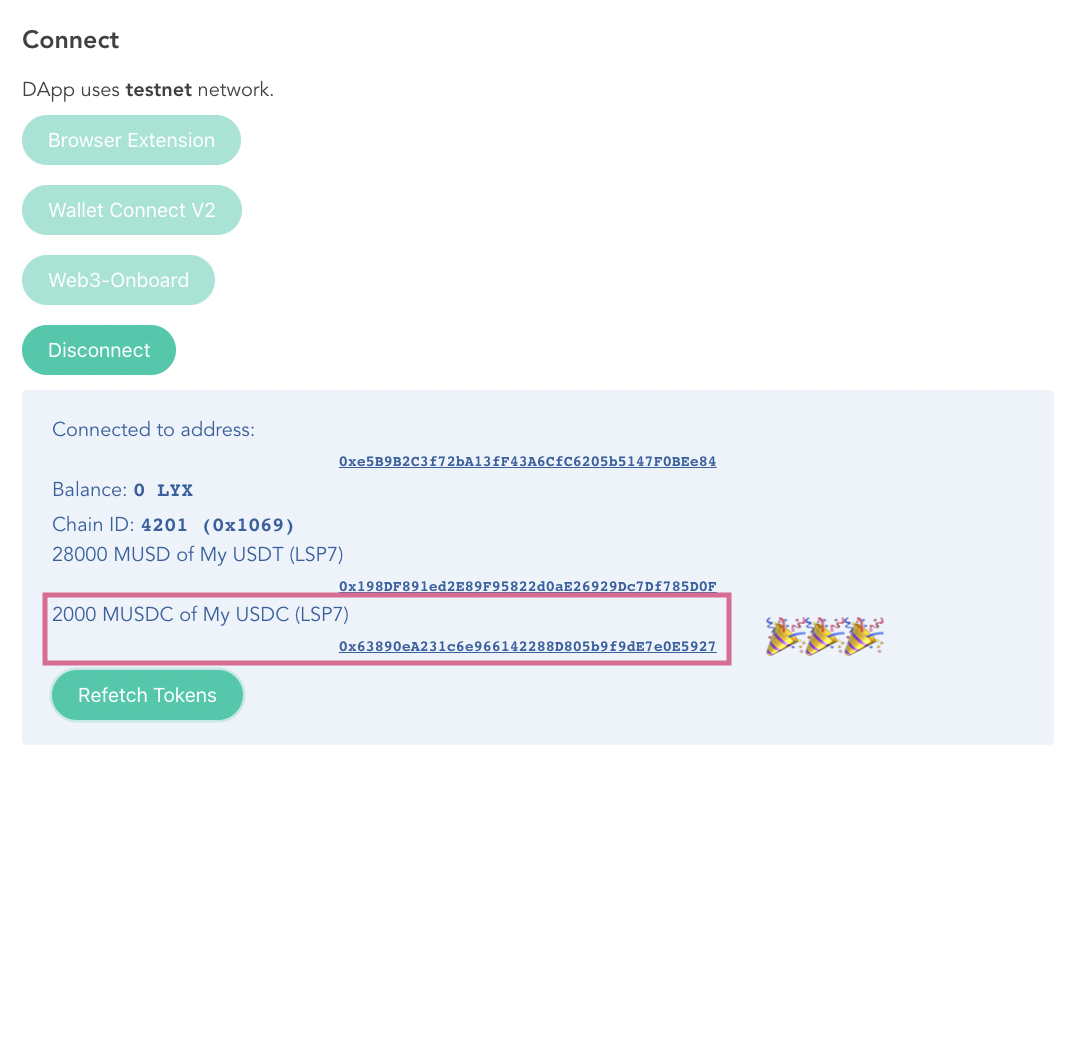
... Success 🎉 ! Our custom LSP1 Delegate forwarder worked as expected!
Congratulations 🥳
You now have a fully functional custom LSP1 Delegate contract that will automatically forward a certain amount of the allowed received tokens to another UP!